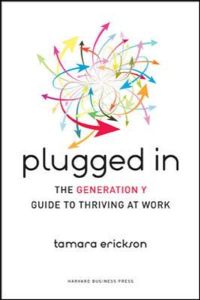At TomorrowToday, we are predicting that the recession is only exacerbating the long term trend of companies needing to battle for the talented and appropriately skilled employees they need in order to be successful. We are particularly concerned of a talent exodus as soon as the recession begins to end – your best employees who are sticking it out now, surviving your bad recession-time employee engagement policies, are likely to up and off when the head hunters start calling.
But there is a talent shortage even now, in the midst of recession.
Are you ready to keep fighting the battle for top talent?
Tammy Erickson, author of “Plugged In: The Generation Y Guide to Thriving at Work” (buy at Amazon.co.uk or Kalahari.net) writes this on her blog:
But the reality is that talent shortages are already here — even in this economy. Today, there are roughly 3 million unfilled jobs in the United States — largely ones requiring specific skills and training — in areas such as health care. Essentially our economy is becoming more “sticky.” As a higher percentage of jobs require specialized skill or experience, it is more difficult for individuals laid off from one organization to move seamlessly to another. Even with millions unemployed, many jobs remain unfilled.
As the economy rebounds, the shortages will become more pronounced. A very high percentage of the new jobs created today (some estimates run as high as 75% of all new jobs in the U.S.) require some level of post-high school education or experience. Yet our education patterns have not shifted to keep pace (in the U.S., less than 30% of Gen Y’s graduate from college and over 20% do not even graduate from high school!).
On top of the skills mismatch, is the irrefutable fact that birth rates — in almost every part of the world — are falling. In the United States, birth rates have been declining for several decades; these “no growth” cohorts of young people are now the ones entering the workforce. We are accustomed to fueling growth in our businesses with a steady stream of young talent, with numbers that increase at pace with our growing demand for labor. No more. Growth cannot be fueled by the young.
From a raw numbers perspective, predictions made before the recession pointed to a shortage of 3-4 million total workers in the U.S. by 2010 and 6 million college graduates by 2012. Currently, total job losses in this recession number about 5 million, the vast majority in fields that do not require college degrees. From this, I’d conclude that closing the gap between available workers and jobs in sectors that require minimal education will lag the recovery by several years, but tightness in other sectors will be broadly and quickly apparent as the economy begins to rebound.
Assuming that immigration will fill any void is a risky assumption. As I mentioned, birth rates are falling around the globe. More importantly, opportunities are increasing in other countries, making immigration for careers less necessary. Today the U.S. has a net emigration of workers who hold advanced degrees (masters and PhDs), as many who came here for education are returning to their home countries for work.
All of this means that the supply/demand balance will continue to shift in favor of the person seeking work — particularly if that individual is skilled, educated and/or experienced. The most significant implication of this shift is that individuals will be able to bargain for whatever unique work arrangements they prefer — companies will need to offer greater choice. Work arrangements will become more varied, reflecting the needs and preferences of people in different generations and stages of life.
A number of forces evident in today’s workplace provide clues as to the types of choice and variety that organizations will offer. The characteristics of knowledge work are such that having workers physically present in one place and time becomes far less important than it was for production jobs. Technology enables new ways of working — asynchronous and virtual. The values of younger generations — more interested in self-reliance or immediate challenge — loosen the bond between a single organization and those who perform work.
These themes — shortages of skilled talent, a growing number of broadly flexible working arrangements — will characterize the emerging relationships between organizations and those who work. And the new strategies outlined in the books, for both corporations and individuals, remain critically important.
But, in the books, I missed a major point: that a recession would actually hasten the movement to these new types of relationships. I thought the new relationships would come about as pressure mounted from individuals who were requesting different types of work arrangements. In fact, as I argued in my last post, companies are inadvertently and ironically conditioning individuals to new ways of working, by breaking the dependency on one all-encompassing work relationship. The use of furloughs and other approaches that erode the concept of one “job” fulfilling all our needs is encouraging individuals to create portfolios of work options.
Source: http://tr.im/rSKa



Trackbacks/Pingbacks